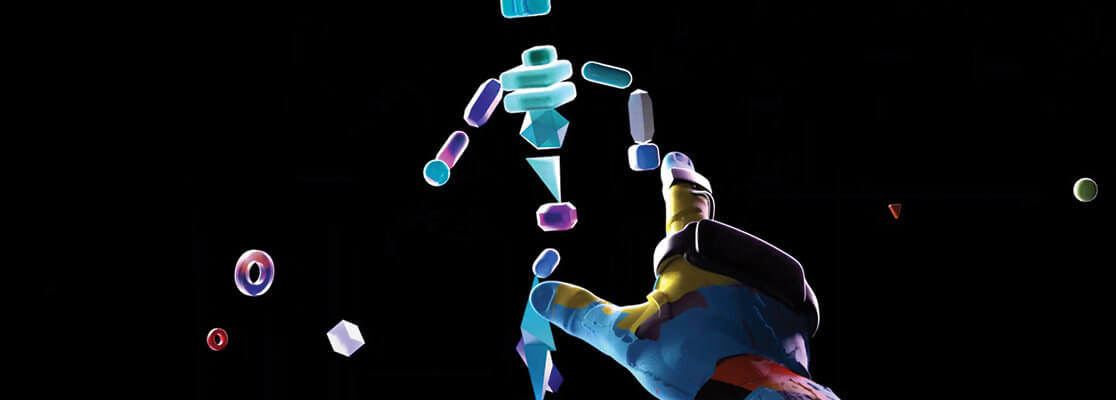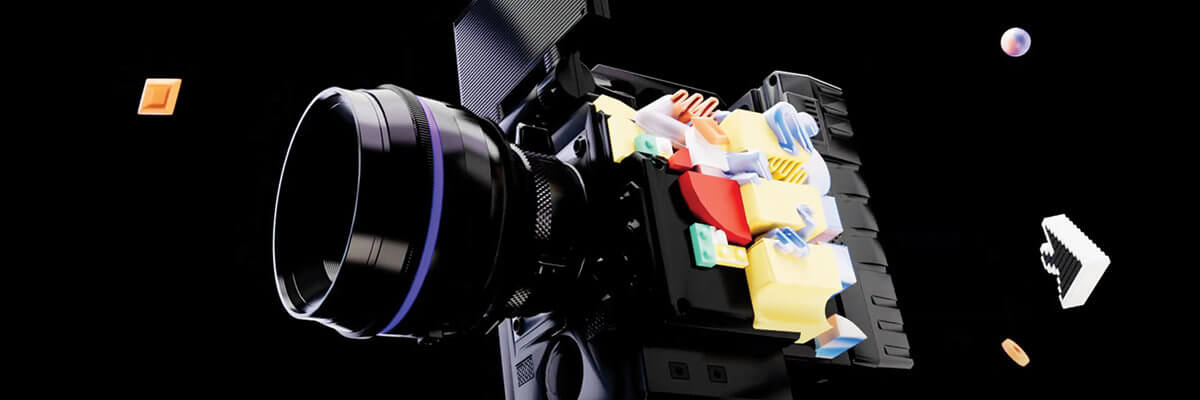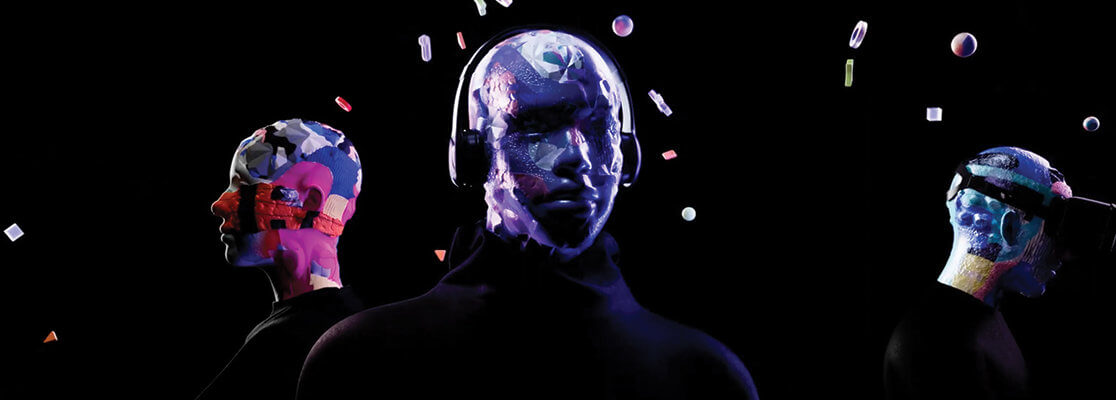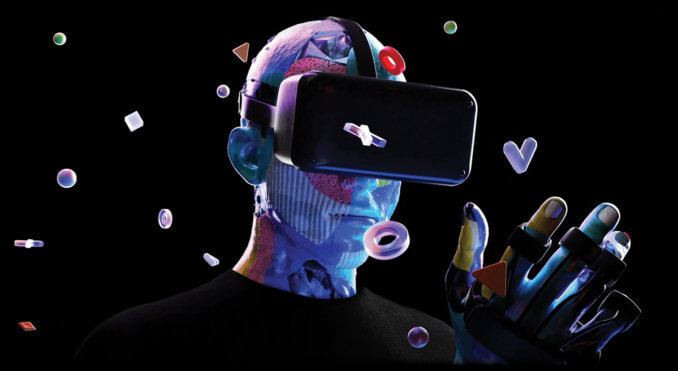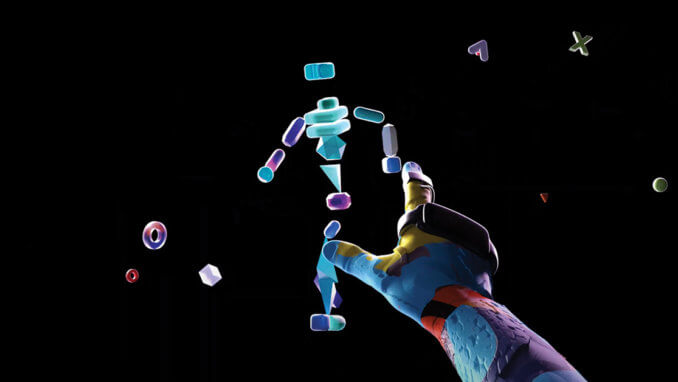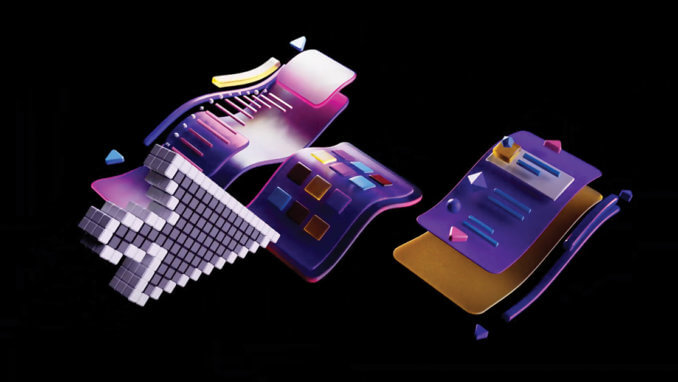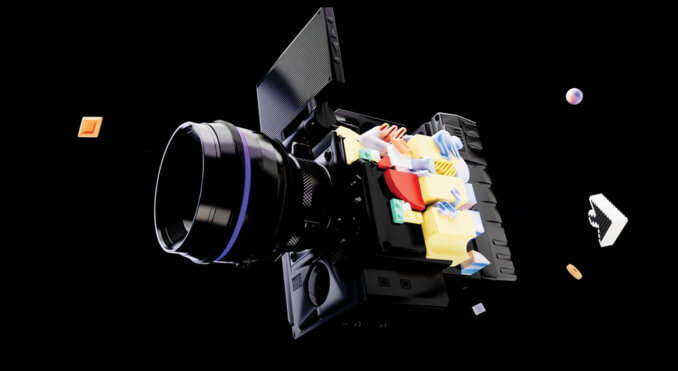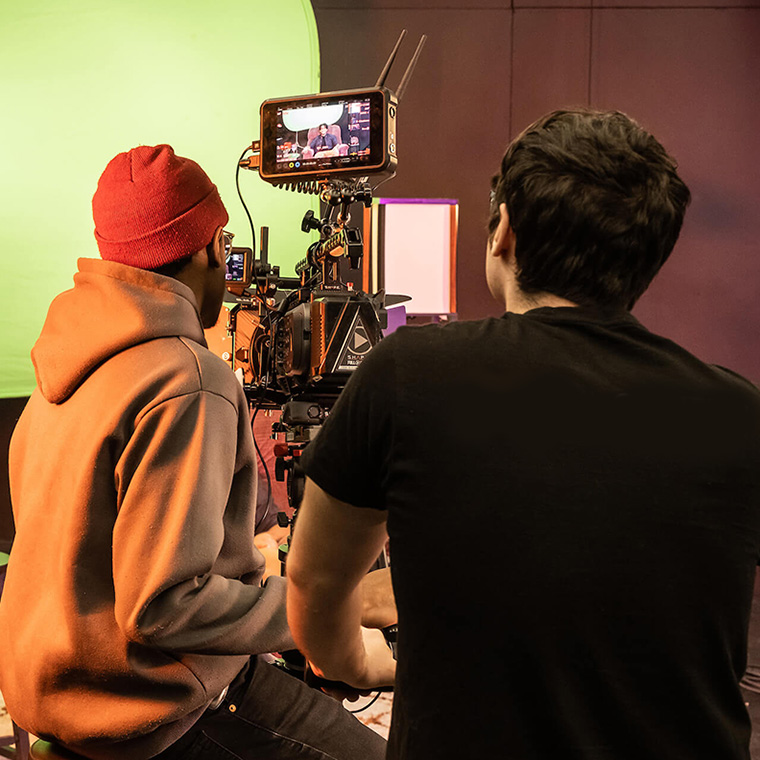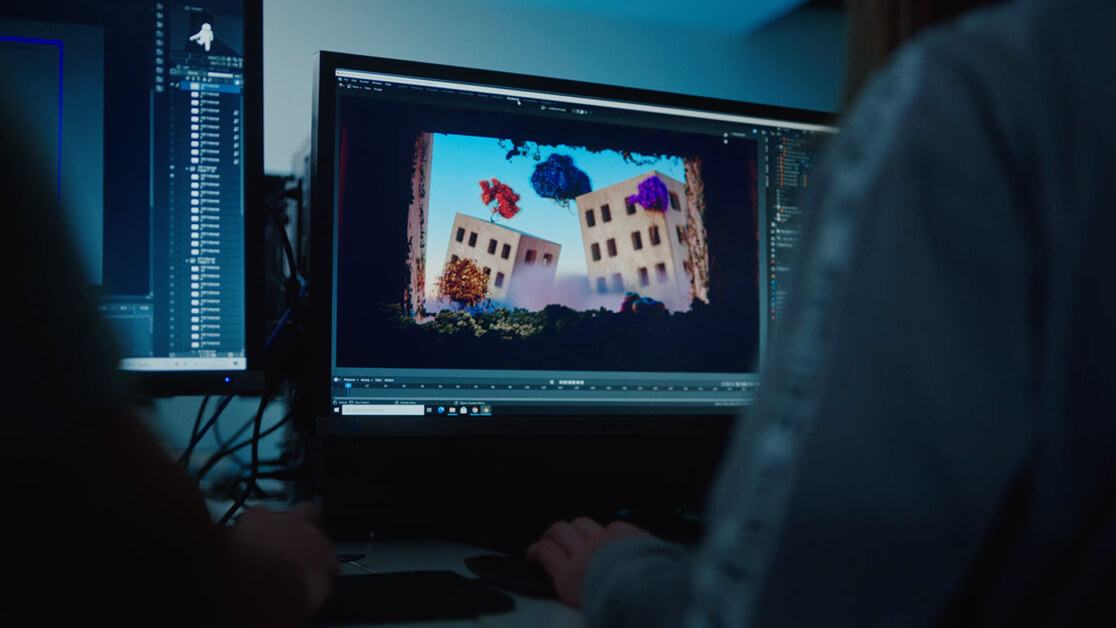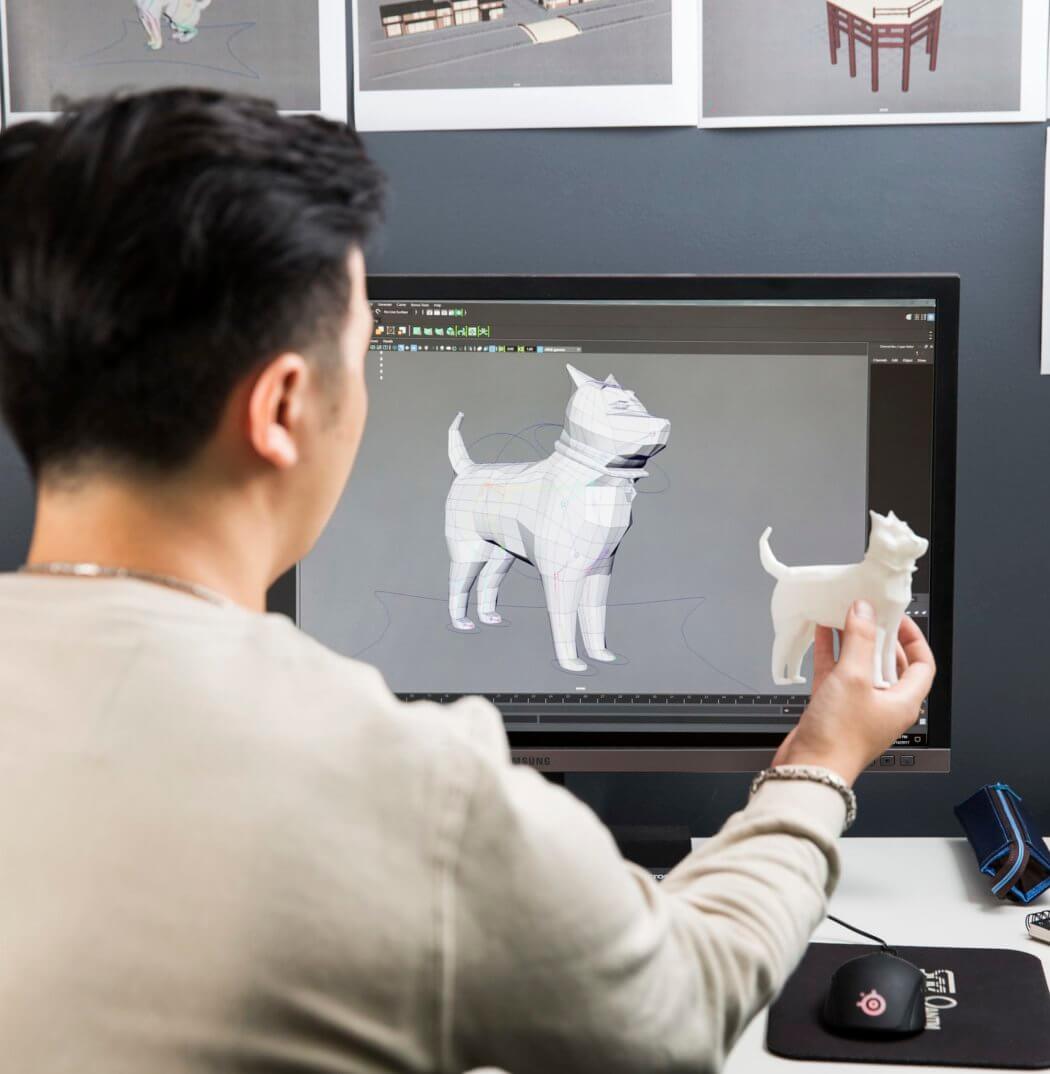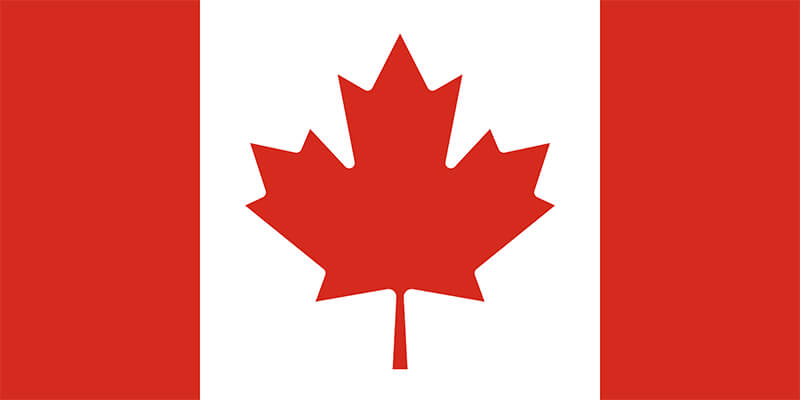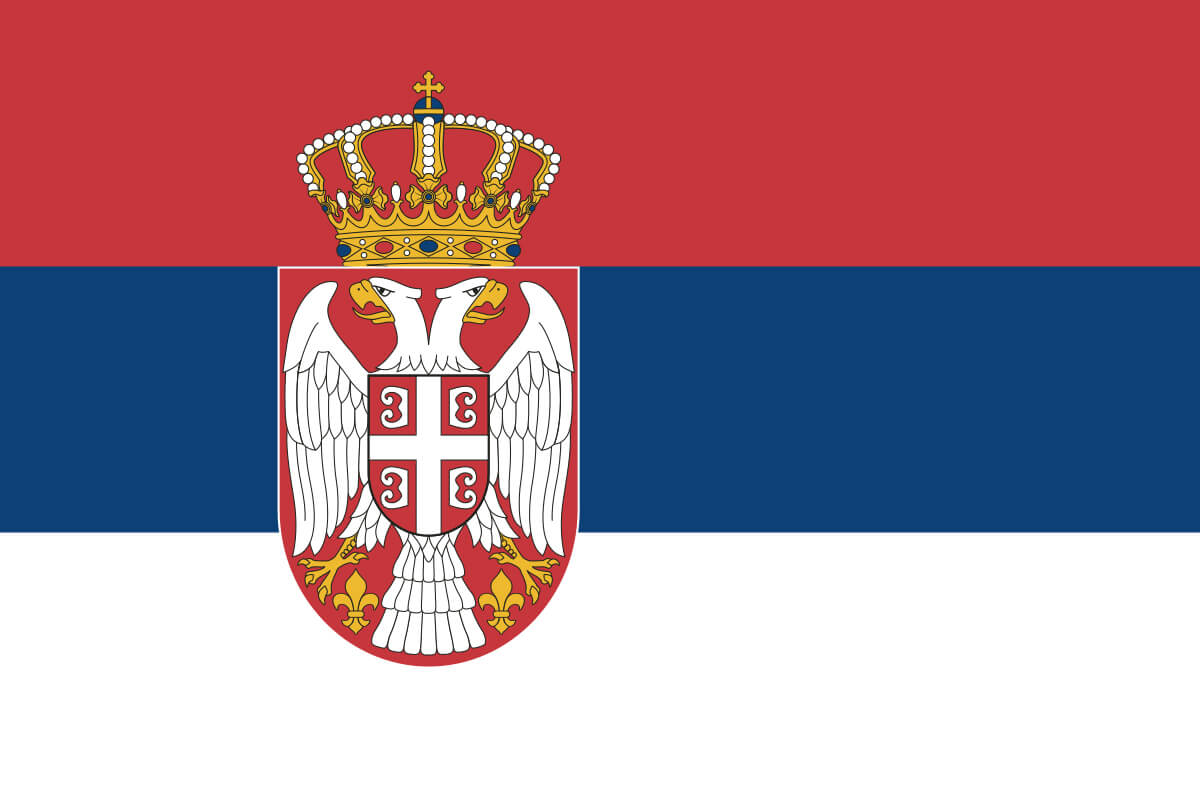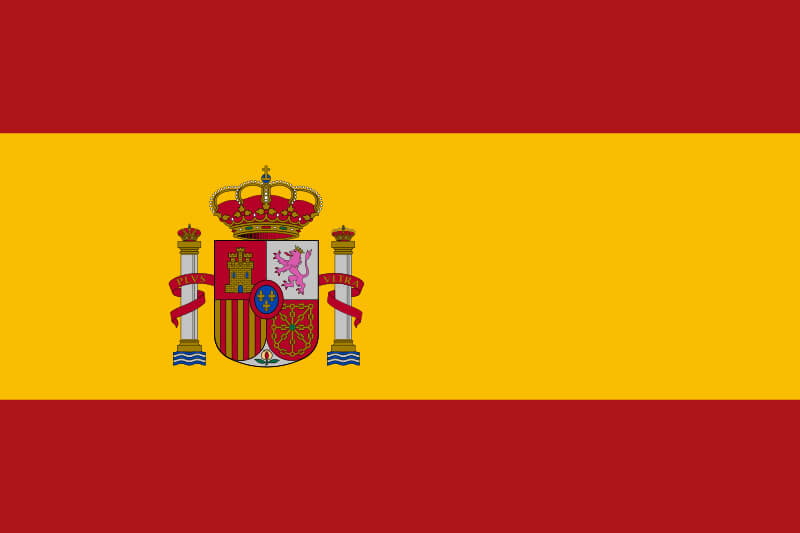Bachelor of Animation
YOUR DREAM CAREER IN ANIMATION IS ONLY LIMITED BY YOUR IMAGINATION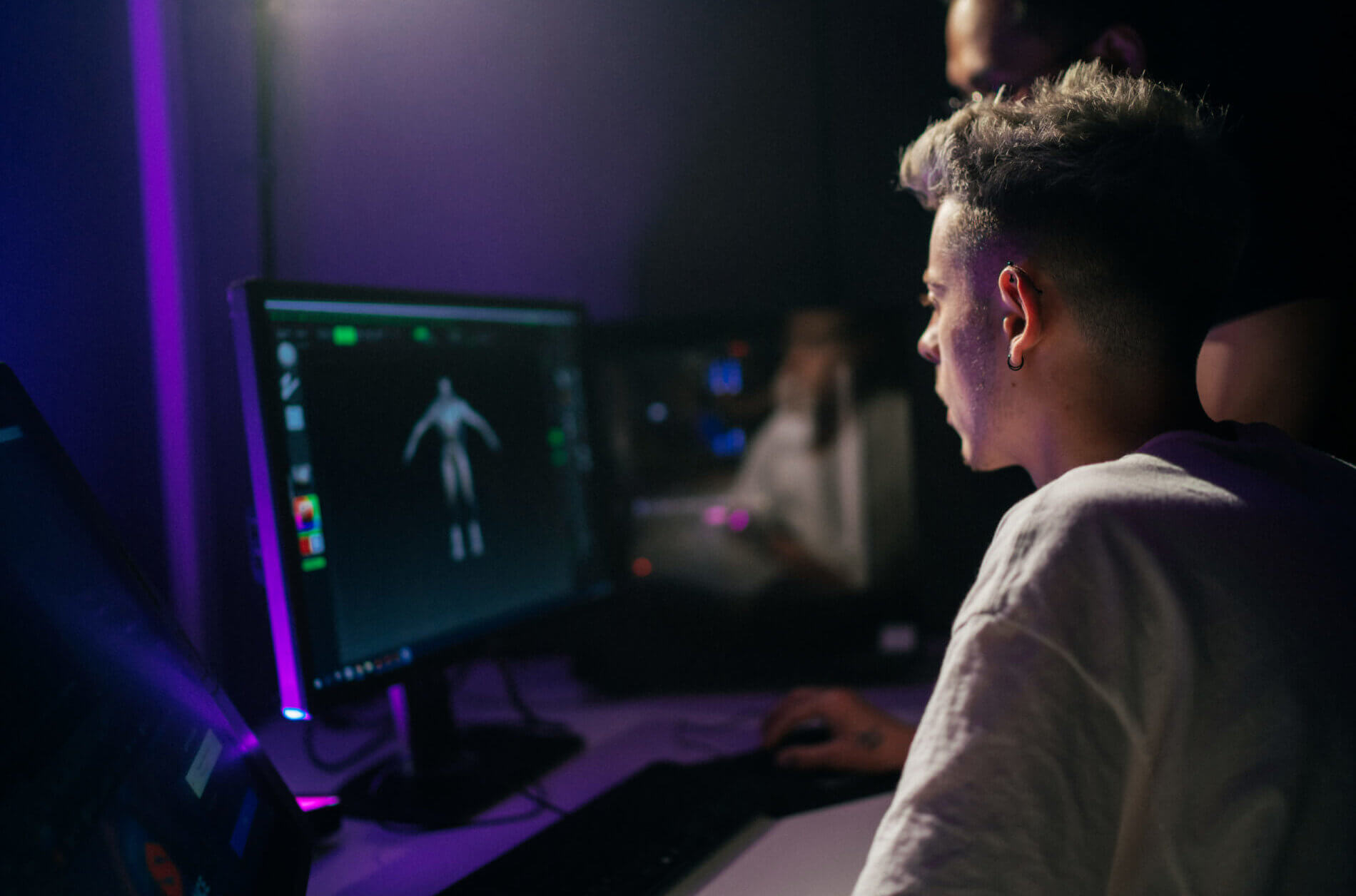
Available at
Dubai
Fees
Bachelor of Animation
Domestic Fees
- Plan A – Yearly Payment – AED 57,960
- Plan B – Trimester Payment – AED 21,090
- Plan C – Monthly Payment – AED 7,490 (9 Payments per Year)
Bachelor of Animation
International Fees
- Plan A – Yearly Payment – AED 57,960
- Plan B – Trimester Payment – AED 21,090
- Plan C – Monthly Payment – AED 7,490 (9 Payments per Year)
Duration(s)
8 Trimesters Full Time
Complete the program across 3 years (8 trimesters)
Bachelor of Animation
Course Durations
8 Trimesters Full Time
Complete the program across 3 years (8 trimesters)
We understand that things can change, so you'll have the flexibility to change your study load throughout your course if you need to.
Start Date(s)
Dubai
2025 – May, Dubai
2025 – September, Dubai
Bachelor of Animation
Start Dates
Dubai
2025 – May, Dubai
2025 – September, Dubai
Entry Requirements
Bachelor of Animation
Domestic Entry Requirements
Domestic Entry Requirements
Minimum age requirements
Academic requirements
English language requirements
International English Language Testing System (IELTS): A band score of 6 or higher for a Higher Education (HE) course and 5.5 or higher for a VET course (only the Academic Test is accepted), OR
Test of English as a Foreign Language (TOEFL): A score of 550 or higher (paper based test), 60 or higher (internet based test) for a Higher Education (HE) course and a minimum score of 527 (paper based test) or 46 (internet based test) for a VET course, OR
Bachelor of Animation
International Entry Requirements
International Entry Requirements
Minimum age requirements
Academic requirements
English language requirements
International English Language Testing System (IELTS): A band score of 6 or higher for a Higher Education (HE) course and 5.5 or higher for a VET course (only the Academic Test is accepted), OR
Test of English as a Foreign Language (TOEFL): A score of 550 or higher (paper based test), 60 or higher (internet based test) for a Higher Education (HE) course and a minimum score of 527 (paper based test) or 46 (internet based test) for a VET course, OR
YOUR CAREER IN ANIMATION BEGINS NOW
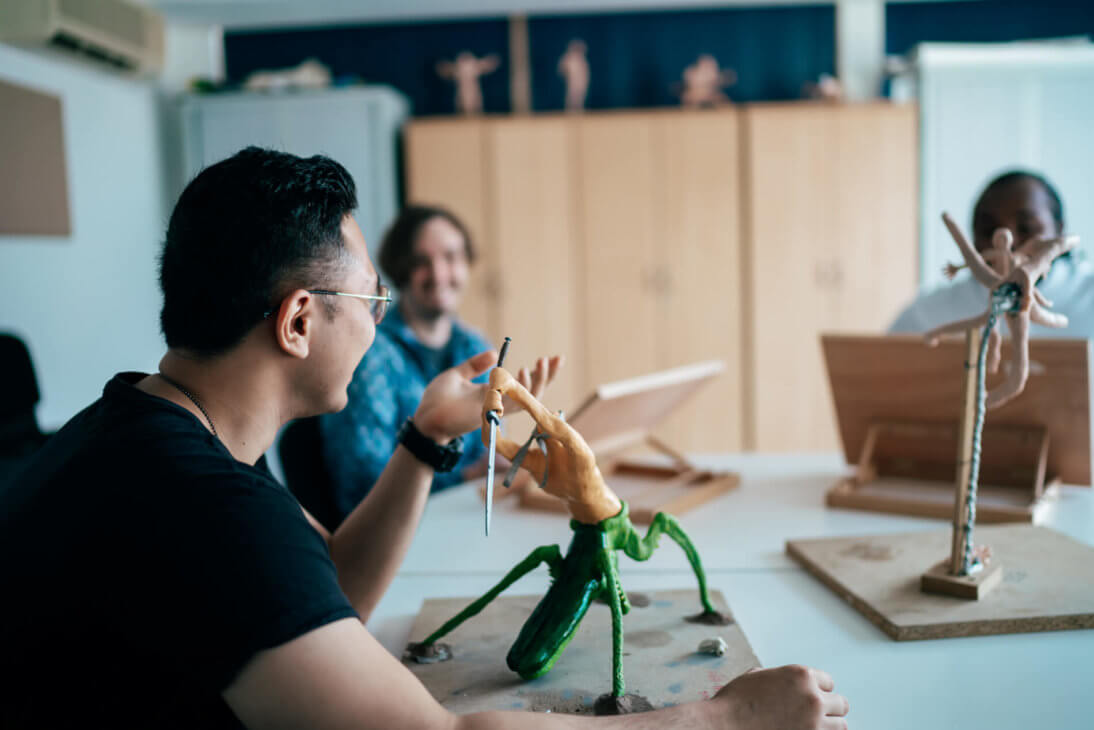
Develop advanced skills in industry-standard software packages
Autodesk 3ds Max, ToonBoom Harmony, Substance Painter, Unreal Engine 4, Unity, SideFX Houdini, Foundry NukeX, Pixologic ZBrush and Adobe Creative Suite.
Practical, immersive training
All work is project based, with no exams. Graduate with a portfolio to share with an employer or first client.
Cross discipline collaboration
Work across film, gaming and audio projects at SAE.
Expand your career
Graduate with a portfolio, work experience, employability and entrepreneurial skills and a network of fellow creatives.
Tools & Software



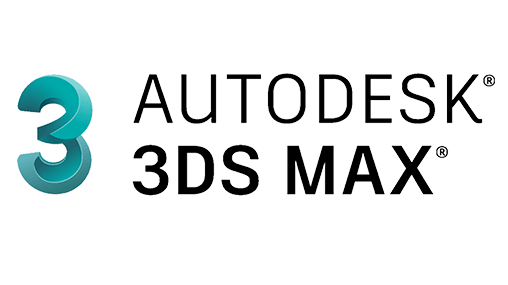

Animation skills
Character animation (2D/3D)
Visual storytelling
3D modelling & computer graphics
Visual effects & motion graphics
Course Structure
The Bachelor of Animation is broken up into three distinct stages over eight trimesters (full time, fast track). Each stage is designed to develop different skills.
Stage 1: Foundations
Develop the essential technical animation skills and the knowledge required to collaborate with other creative media students and professionals.
Credit Points: 10
Develop your reflective, critical and analytical skills and abilities through an enhanced awareness and understanding of the purpose of tertiary education from a personal, societal and professional perspective. In class activities are used to prepare you with the skills and confidence to engage with a range of scholarly frameworks that you will encounter throughout your studies. You will explore the animation discipline through a team presentation, where you will develop group working, thinking and learning skills.
Develop your reflective, critical and analytical skills and abilities through an enhanced awareness and understanding of the purpose of tertiary education from a personal, societal and professional perspective. In class activities are used to prepare you with the skills and confidence to engage with a range of scholarly frameworks that you will encounter throughout your studies. You will explore the animation discipline through a team presentation, where you will develop group working, thinking and learning skills.
Credit Points: 10
As the name suggests this unit provides you with an introduction to animation. You will apply the theoretical underpinnings of animation processes via a range of practical explorations and critical analyses. This will provide you with a solid understanding of animation principles and methods that will form the foundation of successive animation units.
As the name suggests this unit provides you with an introduction to animation. You will apply the theoretical underpinnings of animation processes via a range of practical explorations and critical analyses. This will provide you with a solid understanding of animation principles and methods that will form the foundation of successive animation units.
Credit Points: 10
As a practice, drawing provides a core skill set for the expression of both concept and form. This unit introduces you to the concepts and methodologies of drawing using a variety of media with an emphasis on drawing from life, including anatomical studies and perspective techniques for environment and character construction.
The unit is an introduction to the general practice of drawing and rendering and specifically helps to scaffold further learning through support for developing sketch-based visual production skills & knowledge.
As a practice, drawing provides a core skill set for the expression of both concept and form. This unit introduces you to the concepts and methodologies of drawing using a variety of media with an emphasis on drawing from life, including anatomical studies and perspective techniques for environment and character construction.
The unit is an introduction to the general practice of drawing and rendering and specifically helps to scaffold further learning through support for developing sketch-based visual production skills & knowledge.
Credit points: 10
This unit will introduce you to the mindset and skillset of the creative entrepreneur, and transform your approach to problem-solving. You will analyse historical and contemporary models of leadership and best practice in entrepreneurship, and use tools for project design that include ideation, problem framing, and pitching. The skills in this unit will assist you in developing your creative thinking, exploration, and experimentation methods, allowing you to experiment with project design and content for creative media.
This unit will introduce you to the mindset and skillset of the creative entrepreneur, and transform your approach to problem-solving. You will analyse historical and contemporary models of leadership and best practice in entrepreneurship, and use tools for project design that include ideation, problem framing, and pitching. The skills in this unit will assist you in developing your creative thinking, exploration, and experimentation methods, allowing you to experiment with project design and content for creative media.
Credit Points: 10
In this unit, you will apply and build upon the foundational animation and computer graphics skills and knowledge that you have learned, to advance your skills via some in-depth, practical activities of 2D/3D character modeling and applied animation techniques.
By undertaking a series of iterative tasks, your static models will become talking moving characters and you will develop the skills and knowledge required to showcase them effectively.
In this unit, you will apply and build upon the foundational animation and computer graphics skills and knowledge that you have learned, to advance your skills via some in-depth, practical activities of 2D/3D character modeling and applied animation techniques.
By undertaking a series of iterative tasks, your static models will become talking moving characters and you will develop the skills and knowledge required to showcase them effectively.
Credit Points: 10
Take a practical first look at modeling, lighting, shading, animation, and rendering to gain a holistic, foundational understanding of computer graphics.
This unit will involve using industry-standard software such as Autodesk 3Ds Max, Maya, and Blender. The practical and theoretical knowledge of 3D production pipelines acquired in this unit will act as a foundation for successive animation units.
Take a practical first look at modeling, lighting, shading, animation, and rendering to gain a holistic, foundational understanding of computer graphics.
This unit will involve using industry-standard software such as Autodesk 3Ds Max, Maya, and Blender. The practical and theoretical knowledge of 3D production pipelines acquired in this unit will act as a foundation for successive animation units.
Credit points: 10
ANI175 "Cinematography Previs and Animatics" unit is designed to provide students with a comprehensive understanding of visual storytelling and composition principles and the practical skills to communicate intended narratives effectively through pre-production materials. Students will learn to utilise industry-standard pre-production software tools to create previsualization sequences, enabling them to simulate camera movements, pacing, and shot composition. Through hands-on exercises and project work, students will develop the necessary expertise to produce high-quality previs and animatics, essential elements in modern filmmaking and animation pipelines.
ANI175 "Cinematography Previs and Animatics" unit is designed to provide students with a comprehensive understanding of visual storytelling and composition principles and the practical skills to communicate intended narratives effectively through pre-production materials. Students will learn to utilise industry-standard pre-production software tools to create previsualization sequences, enabling them to simulate camera movements, pacing, and shot composition. Through hands-on exercises and project work, students will develop the necessary expertise to produce high-quality previs and animatics, essential elements in modern filmmaking and animation pipelines.
Credit points: 10
You will be introduced to the theory and principles of storytelling across a range of contemporary creative media contexts, which will then be applied to the creation of storytelling documents appropriate to your discipline. Theoretical approaches to plot, structure, character, story world, theme and genre will be explored and applied to a range of story development tools to engage your audience. Feedback processes and reflection are essential in the development of engaging stories, and you are expected to document your process and feedback from your facilitator and peers.
You will be introduced to the theory and principles of storytelling across a range of contemporary creative media contexts, which will then be applied to the creation of storytelling documents appropriate to your discipline. Theoretical approaches to plot, structure, character, story world, theme and genre will be explored and applied to a range of story development tools to engage your audience. Feedback processes and reflection are essential in the development of engaging stories, and you are expected to document your process and feedback from your facilitator and peers.
Stage 2: Refine & Expand
Broaden your scope to work on complex multidisciplinary projects in accordance with industry standard practices.
Credit Points: 10
In CIM210 you will be working on interdisciplinary projects that relate to some of the most important concepts in contemporary media production. You will learn practical and analytical skills in order to help you develop your creative powers and meet briefs that take you out of your comfort zone. You will need to bring all of the skills you have learned so far: technical skills, research skills, communication skills and a growth mindset, and be prepared to encounter new concepts and new ways of working.
In CIM210 you will be working on interdisciplinary projects that relate to some of the most important concepts in contemporary media production. You will learn practical and analytical skills in order to help you develop your creative powers and meet briefs that take you out of your comfort zone. You will need to bring all of the skills you have learned so far: technical skills, research skills, communication skills and a growth mindset, and be prepared to encounter new concepts and new ways of working.
Credit points: 20
In this studio unit, your facilitator will lead you through a series of project briefs. You will work in collaboration with your peers to develop several project milestones within a simulated studio environment. Your Facilitator will act as your project manager, executive producer, mentor and colleague. The emphasis in this module is on the further development of your fundamental animation production skills including conceptualising, planning and executing rapid animation productions and short films. Working to a clear timeline, you will explore a range of skills and workflows in collaborative, cross-discipline and individual work practices. This includes a focus on the creative, technical and project management aspects required to complete animation productions. Teamwork, collaborative skills and engagement with specific feedback processes are emphasised in this module, as you further refine and reflect on the related Transferable Skills for this module.
In this studio unit, your facilitator will lead you through a series of project briefs. You will work in collaboration with your peers to develop several project milestones within a simulated studio environment. Your Facilitator will act as your project manager, executive producer, mentor and colleague. The emphasis in this module is on the further development of your fundamental animation production skills including conceptualising, planning and executing rapid animation productions and short films. Working to a clear timeline, you will explore a range of skills and workflows in collaborative, cross-discipline and individual work practices. This includes a focus on the creative, technical and project management aspects required to complete animation productions. Teamwork, collaborative skills and engagement with specific feedback processes are emphasised in this module, as you further refine and reflect on the related Transferable Skills for this module.
In ANI219 Concept Art, you will learn about the practice of visual storytelling. Your goal as a concept artist, is to express an idea with clarity and detail enough to engage the audience to want to know more about the world depicted. As much as concept art is about imagination and creation, it is also a discipline focusing on iteration and efficiency. In this unit, you will gain a fundamental understanding of the production and implementation of concept art into the pipeline of many different productions. You will learn about illustration and the creative and technical production of digital images. Working by hand and digitally you will explore a range of drawing techniques and tools including processes of iteration and refinement.
Credit Points: 10
ANI217 Cinematic Animation explores advanced character animation techniques for linear narratives. The focus is on bringing characters to life and clearly communicating a story through body language, dialogue animation, facial expression and shot composition. By combining acting theory with animation principles, students develop the skills necessary to create compelling and expressive character performances, enhancing their ability to breathe life into animated narratives with authenticity and depth. Students will apply their previously acquired knowledge alongside newly acquired skills to create a completed cinematic animation production, solidifying their proficiency in the art of cinematic storytelling through animation.
ANI217 Cinematic Animation explores advanced character animation techniques for linear narratives. The focus is on bringing characters to life and clearly communicating a story through body language, dialogue animation, facial expression and shot composition. By combining acting theory with animation principles, students develop the skills necessary to create compelling and expressive character performances, enhancing their ability to breathe life into animated narratives with authenticity and depth. Students will apply their previously acquired knowledge alongside newly acquired skills to create a completed cinematic animation production, solidifying their proficiency in the art of cinematic storytelling through animation.
Credit Points: 10
ANI218 Game Animation focuses on the creation and integration of both 2D and 3D animation for games and other interactive applications. Covering topics such as player locomotion, responsive gameplay animation, animation cycles and technical animation, students gain practical skills essential for crafting immersive gaming experiences. Through hands-on projects and theoretical exploration, students develop proficiency in animating characters to enhance player engagement and gameplay dynamics, preparing them for success in the field of game animation.
ANI218 Game Animation focuses on the creation and integration of both 2D and 3D animation for games and other interactive applications. Covering topics such as player locomotion, responsive gameplay animation, animation cycles and technical animation, students gain practical skills essential for crafting immersive gaming experiences. Through hands-on projects and theoretical exploration, students develop proficiency in animating characters to enhance player engagement and gameplay dynamics, preparing them for success in the field of game animation.
Credit Points: 10
ANI215 Technical Animation and Rigging is a practical course designed to develop or extend skills in rigging and animation. You will encounter a range of concepts and strategies related to the production of functional and user friendly rigs, utilising different approaches to develop projects in response to various scenarios. Through short exercises and guided instruction, you will gain an introductory understanding of rigging and animation concepts, focusing on problem-solving and adapting to specific animation needs.
Following an industry model, students will be tasked with rigging pre-existing meshes to conform to designated animation standards. The course underscores the significance of grasping rigging fundamentals. Ultimately, the objective is for students to demonstrate their comprehension of rigging and technical animation principles by adeptly addressing varied project specifications, irrespective of the software utilised. Objectives and project requirements are not confined to any particular software platform.
ANI215 Technical Animation and Rigging is a practical course designed to develop or extend skills in rigging and animation. You will encounter a range of concepts and strategies related to the production of functional and user friendly rigs, utilising different approaches to develop projects in response to various scenarios. Through short exercises and guided instruction, you will gain an introductory understanding of rigging and animation concepts, focusing on problem-solving and adapting to specific animation needs.
Following an industry model, students will be tasked with rigging pre-existing meshes to conform to designated animation standards. The course underscores the significance of grasping rigging fundamentals. Ultimately, the objective is for students to demonstrate their comprehension of rigging and technical animation principles by adeptly addressing varied project specifications, irrespective of the software utilised. Objectives and project requirements are not confined to any particular software platform.
Credit Points: 10
Media and culture are not simply entertainment, but something that affects the “real world”, our everyday lives, and our worldviews. As such, we will not ask whether media accurately reflect the real world but instead ask how media shape, reinforce, and challenge power structures that influence our understanding of the world and ourselves. This unit takes a ‘critical theory’ approach to analyze media and culture. In this unit, you will explore media texts, contexts and meaning, society and subjectivity, pop culture aesthetics, and critical cultural discourses that inform creative media practices.
Drawing on a range of creative content and analytical frameworks, you will be encouraged to develop ways of thinking about media and culture that demonstrate a broad awareness of aesthetic principles and stylistic trends; subjectivity, agency, ethics, and relations of power; contexts, disciplines and discursive formations. In support of this exploration, you will produce a range of media artifacts that explore and contextualize the relationship of media to culture through individual analysis, collaborative and interdisciplinary creative practice, and critical reflection.
Media and culture are not simply entertainment, but something that affects the “real world”, our everyday lives, and our worldviews. As such, we will not ask whether media accurately reflect the real world but instead ask how media shape, reinforce, and challenge power structures that influence our understanding of the world and ourselves. This unit takes a ‘critical theory’ approach to analyze media and culture. In this unit, you will explore media texts, contexts and meaning, society and subjectivity, pop culture aesthetics, and critical cultural discourses that inform creative media practices.
Drawing on a range of creative content and analytical frameworks, you will be encouraged to develop ways of thinking about media and culture that demonstrate a broad awareness of aesthetic principles and stylistic trends; subjectivity, agency, ethics, and relations of power; contexts, disciplines and discursive formations. In support of this exploration, you will produce a range of media artifacts that explore and contextualize the relationship of media to culture through individual analysis, collaborative and interdisciplinary creative practice, and critical reflection.
Stage 3: Showcase
Execute a project of your own design which is of a high quality and externally published, with the knowledge to commercialise if you choose. You'll also apply your skills through industry work placement.
Credit Points: 20
In ANI315 Animation Projects, students engage in a hands-on production unit designed to simulate a professional studio environment, where they consolidate and apply their previously acquired production skills to create comprehensive animation projects. Through practical application and collaborative teamwork, students navigate the entire animation production process, from conceptualisation and pre-production planning to animation execution and post-production refinement. By immersing themselves in real-world production scenarios, students cultivate essential industry skills while gaining valuable experience in project management, creative problem-solving, and teamwork, preparing them for successful careers in the animation industry.
In ANI315 Animation Projects, students engage in a hands-on production unit designed to simulate a professional studio environment, where they consolidate and apply their previously acquired production skills to create comprehensive animation projects. Through practical application and collaborative teamwork, students navigate the entire animation production process, from conceptualisation and pre-production planning to animation execution and post-production refinement. By immersing themselves in real-world production scenarios, students cultivate essential industry skills while gaining valuable experience in project management, creative problem-solving, and teamwork, preparing them for successful careers in the animation industry.
Credit Points: 10
Major Project Development forms the first component of your Capstone Project. In this unit you will work to conceptualise, plan, design and iterate the development, pre-production and early production stages of a full scale creative project. This will be assessed by two projects: a research component and a production planning component. Together, both of these documents will inform the basis for your CIM330 project, and will identify key moments of production, testing and operative cycles designed to help make your creative project a success.
Your class facilitator will work with you to control and guide the scope of your project. This process ensures that by the end of CIM330 Major Project Production you will have a portfolio piece that represents the sum total of your skills and experience, delivered on time and to specification.
As stage 3 students, it is expected that you are at a level where you can synthesise your reflective practice with your discipline and research work. Therefore, there is no CLO1 or learning journal for this unit. Instead you will deliver appendices to projects 1 and 2, which contain examples of your practice that demonstrate the research and planning that you have undertaken.
This does not mean you do not record your pre-class work or maintain a learning journal for your own purposes - rather it is assumed you are using the pre-class and in class activities as tools to enrich your project development and are applying the various lenses and concepts.
Major Project Development forms the first component of your Capstone Project. In this unit you will work to conceptualise, plan, design and iterate the development, pre-production and early production stages of a full scale creative project. This will be assessed by two projects: a research component and a production planning component. Together, both of these documents will inform the basis for your CIM330 project, and will identify key moments of production, testing and operative cycles designed to help make your creative project a success.
Your class facilitator will work with you to control and guide the scope of your project. This process ensures that by the end of CIM330 Major Project Production you will have a portfolio piece that represents the sum total of your skills and experience, delivered on time and to specification.
As stage 3 students, it is expected that you are at a level where you can synthesise your reflective practice with your discipline and research work. Therefore, there is no CLO1 or learning journal for this unit. Instead you will deliver appendices to projects 1 and 2, which contain examples of your practice that demonstrate the research and planning that you have undertaken.
This does not mean you do not record your pre-class work or maintain a learning journal for your own purposes - rather it is assumed you are using the pre-class and in class activities as tools to enrich your project development and are applying the various lenses and concepts.
Credit Points: 10
Developing your personal and professional practice is an essential part of the creative media practitioner’s skill set. Identifying knowledge areas and skill sets you may need to improve upon for your personal and professional development, then developing an action plan for improvement, are learned skills that a creative practitioner can leverage to continually build upon their goals.
In this unit, through a study of goal setting, SMART goals, and PIMRI improvement processes, you will plan and implement a personal project to develop skill or knowledge in an area of choice for improvement under the tutelage of a mentor. Student and facilitator feedback sessions will help you finesse your project, and exemplars of great goal setting from industry professionals will be used to guide your exploration. Through the completion of this unit, you will develop a practice that can aid you in your personal and professional life.
Developing your personal and professional practice is an essential part of the creative media practitioner’s skill set. Identifying knowledge areas and skill sets you may need to improve upon for your personal and professional development, then developing an action plan for improvement, are learned skills that a creative practitioner can leverage to continually build upon their goals.
In this unit, through a study of goal setting, SMART goals, and PIMRI improvement processes, you will plan and implement a personal project to develop skill or knowledge in an area of choice for improvement under the tutelage of a mentor. Student and facilitator feedback sessions will help you finesse your project, and exemplars of great goal setting from industry professionals will be used to guide your exploration. Through the completion of this unit, you will develop a practice that can aid you in your personal and professional life.
Credit Points: 10
Future jobs will require workers to learn on the job; focus on relationships with people; have strong communication skills; use a range of transferable skills. Research consistently points to the benefits of students being prepared with documents that are required for job applications, such as a Resume, Cover Letter, and E-portfolio.
In addition, the value of a Work Placement which provides you with professional experience and an opportunity to use skills and knowledge gained from study to complement this.
The Work Placement for SAE Bachelor students requires a minimum of 80 hours at one or more host organisation. Both the student and the host are required to complete an SAE Agreement which formalises the placement.
Future jobs will require workers to learn on the job; focus on relationships with people; have strong communication skills; use a range of transferable skills. Research consistently points to the benefits of students being prepared with documents that are required for job applications, such as a Resume, Cover Letter, and E-portfolio.
In addition, the value of a Work Placement which provides you with professional experience and an opportunity to use skills and knowledge gained from study to complement this.
The Work Placement for SAE Bachelor students requires a minimum of 80 hours at one or more host organisation. Both the student and the host are required to complete an SAE Agreement which formalises the placement.
Credit Points: 20
Using the project plan and pre-production work that you completed in the Major Project Development Unit, you'll adopt a quality framework that will lead to the publication of a final creative piece.
This quality process will be accountable to multiple, external stakeholders and will test your ability to problem solve, evaluate and synthesise information to the standard that we expect from all SAE graduates. Throughout this journey, you will interact with your classmates and other key stakeholders using the processes and systems and that you would have developed throughout your course.
The publication and subsequent success of the final deliverable will represent the broadening and deepening of your professional practice which has occurred during your journey.
Using the project plan and pre-production work that you completed in the Major Project Development Unit, you'll adopt a quality framework that will lead to the publication of a final creative piece.
This quality process will be accountable to multiple, external stakeholders and will test your ability to problem solve, evaluate and synthesise information to the standard that we expect from all SAE graduates. Throughout this journey, you will interact with your classmates and other key stakeholders using the processes and systems and that you would have developed throughout your course.
The publication and subsequent success of the final deliverable will represent the broadening and deepening of your professional practice which has occurred during your journey.
Credit Points: 10
Gain an introduction to the principles of entrepreneurship to create and operate your own creative media small business venture. Through analysing the global media landscape, You'll be able to identify and explore start-up opportunities within the creative industries.
This unit is designed to be done in parallel with your capstone project. You'll apply the skills and knowledge from this unit to formulate a rigorous business case to help you commercialise your capstone project and use it as a basis for a creative media start-up.
Gain an introduction to the principles of entrepreneurship to create and operate your own creative media small business venture. Through analysing the global media landscape, You'll be able to identify and explore start-up opportunities within the creative industries.
This unit is designed to be done in parallel with your capstone project. You'll apply the skills and knowledge from this unit to formulate a rigorous business case to help you commercialise your capstone project and use it as a basis for a creative media start-up.
Credit Points: 10
CRICOS Course Codes
105477A (8 TRIMESTERS)
Australian Qualifications Framework
AQF Level: 7
FULLY ACCREDITED BY TEQSA
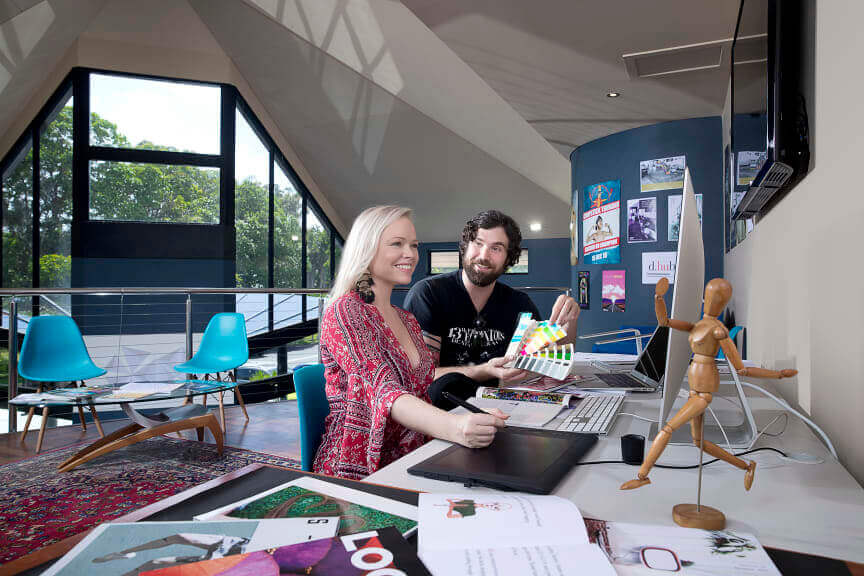
Bachelor of Animation Career Outcomes
What jobs will this course lead to?
3D Generalist
3D or 2D Animator
Concept Artist
Motion Graphics
Designer
Storyboard Artist
Media Industry Specialist
FX Artist
Technical Artist
3D Asset Modeler
3D Character Modeler
Junior Rigging TD
Surfacing Artist
Junior Lighting TD
Production Coordinator
Junior Assembly & Layout Artist
Roto Artist
Junior Matchmover and Cleanup
Junior Compositor



